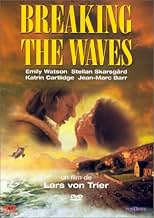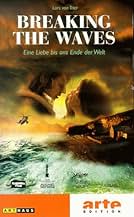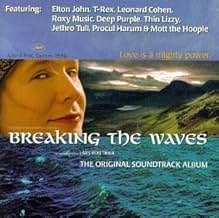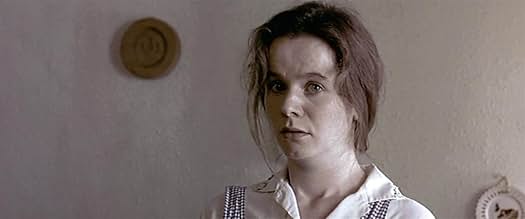AVALIAÇÃO DA IMDb
7,8/10
74 mil
SUA AVALIAÇÃO
Oilman Jan fica paralisado em um acidente. Sua esposa, que orou por seu retorno, se sente culpada; ainda mais, quando Jan a incentiva a fazer sexo com outra pessoa.Oilman Jan fica paralisado em um acidente. Sua esposa, que orou por seu retorno, se sente culpada; ainda mais, quando Jan a incentiva a fazer sexo com outra pessoa.Oilman Jan fica paralisado em um acidente. Sua esposa, que orou por seu retorno, se sente culpada; ainda mais, quando Jan a incentiva a fazer sexo com outra pessoa.
- Direção
- Roteiristas
- Artistas
- Indicado a 1 Oscar
- 45 vitórias e 28 indicações no total
Finlay Welsh
- Coroner
- (as Finley Welsh)
- Direção
- Roteiristas
- Elenco e equipe completos
- Produção, bilheteria e muito mais no IMDbPro
Avaliações em destaque
Lars von Trier's Breaking the Waves is the kind of film that makes me proud to be a film-goer and exceeds anything I could have possibly expected from the man who made Element of Crime. That film had some clever experimentation (and so does this one) but this film is the kind that's beauty and power echoes in your mind hours after you've watched it. This is a flabbergasting work of art that portrays a woman's quest to please God and does so with the complexity and emotional power of a Bergman film (not to mention the fact that the film portrays a woman's intense suffering in world sternly ruled by men with the power of a Dreyer film). If von Trier made nothing else of any merit for the rest of his career, if all he did was make marginally interesting film experiments, I wouldn't hesitate to call him a great filmmaker on the soul basis of this film. Anyway, you get the picture
The film stars Emily Watson as Bess, a shy and neurotic girl who is filled with joy to be with her new husband Jan (Stellan Skarsgard who is exceptional). When Jan is paralyzed after an accident at the oilrig he works in, he is in danger of losing his life. He convinces Bess to see other people and Bess wants nothing more than to make him happy and to prove to God that she loves him. After some disastrous complications, Bess is led to believe that she can please God and save Jan's life by having numerous sexual encounters with strangers in town. This sounds like a grungy tale, but von Trier tells it with such humanism and focus on his themes that we never feel like he is rubbing our faces in drear. And Watson is delightful, frightening, and heartbreaking as a woman who will stop at nothing to please those around her. Her one-sided conversations with God (in which she looks up in the air submissively and pleas and then looks down with a deep voice of wrath and scolds) are both funny and sad, not to mention the fact that they reveal seemingly endless amounts of details about who she is. The film is made with a hand-held camera and a visually stunning solarized style. This style does not make the movie; it just adds richness to each scene in the way it gives each face such shadowy texture. In the end, von Trier seems to believe in God but does not believe in the churches that try to codify what he wants. All of this works because of von Trier's passionate desire to understand how one can please God under horrendous terms; the epilogue, that takes the already-great material to a new level and shows how inspired von Trier is, starts with a moment of sad irony and then leaps to the skies with an image that fills the most atheistic person with questions and the more religiously spiritual people with hope. Here is a film that reaches for the stars and makes it there.
It's a pity that for most people Lars von Trier's involvement with the Dogme group of film makers is the main thing they know about him. Wherever you stand on the Dogme issue (personally I'm all for it as long as they continue to make movies as great as 'Festen' and 'The Idiots'), his brief alliance with the group has overshadowed amazing work like 'Element Of Crime', 'Europa' and 'Breaking The Waves'. 'Breaking The Waves' was made before the Dogme manifesto was formulated, but it can be seen as a step in that direction, with its use of documentary techniques as opposed to the flamboyant and highly stylized approach of von Trier's earlier films. To me the ends justifies the means, and the bottom line is that this is an extraordinary and powerful movie, one of the greatest of the last ten years. The main reason it is so remarkable is because of the devastating performance of Emily Watson, one of the most impressive screen debuts in the history of film. Watson plays Bess McNeill, a naive and odd young woman living in a remote and deeply religious Scottish community. She is so good in this movie she'll leave you speechless! Stellan Skarsgard, a most underrated actor in my opinion,('Insomnia', 'Ronin') plays Bess's husband and is also superb, and the supporting cast includes the late Katrin Cartlidge ('Naked') as Watson's sister-in-law, and von Trier regulars Jean-Marc Barr (almost unrecognizable from his leading role in 'Europa'), as one of Skarsgard's work buddies, and cult legend Udo Kier ('Flesh For Frankenstein', 'The Story Of O') in a cameo as a very nasty piece of work who Bess has the misfortune to encounter. The less you know about this movie the more powerful it will be, and even a jaded cynic like myself was surprised at how effective its spiritual theme was. To me 'Breaking The Waves' is a much better more than von Trier's better known 'Dancer In The Dark', and Watson's performance makes Bjork's look like that of an enthusiastic but not very talented amateur (which of course, is exactly what she is). Highly recommended.
I just finished watching "Breaking the Waves" and am still not sure whether it was a good film or a strong piece of manipulation. Perhaps there is ultimately no difference.
Emily Watson was luminous and altogether convincing, and the camerawork didn't bother me in the slightest. On the contrary, it suited the story immensely - as did the deliberately washed-out palette. A brilliant invocation of a time and place.
However, the story left me feeling like I'd just watched someone kicking a puppy ... for several hours. I dislike the implication that such brutal and violent self-sacrifice can be justified by intense love, and to have this line wrapped up in a dewy religious shroud is a cop-out. It's like watching a documentary about the horrors of sideshow life - with plenty of explicit segments starring the freaks themselves. Allows an audience to moralize and yet be voyeurs at the same time.
Poor Bess was more than naive - whatever brain she was born with was utterly starved of oxygen by the narrow and restrictive community she was born into. I sympathized most with Dodo, who of them all loved Bess the most, and the least selfishly.
I find myself very angry after seeing "Breaking the Waves", which is why I cannot say that I disliked this film. Had I truly disliked it, my response would be less emotional.
Emily Watson was luminous and altogether convincing, and the camerawork didn't bother me in the slightest. On the contrary, it suited the story immensely - as did the deliberately washed-out palette. A brilliant invocation of a time and place.
However, the story left me feeling like I'd just watched someone kicking a puppy ... for several hours. I dislike the implication that such brutal and violent self-sacrifice can be justified by intense love, and to have this line wrapped up in a dewy religious shroud is a cop-out. It's like watching a documentary about the horrors of sideshow life - with plenty of explicit segments starring the freaks themselves. Allows an audience to moralize and yet be voyeurs at the same time.
Poor Bess was more than naive - whatever brain she was born with was utterly starved of oxygen by the narrow and restrictive community she was born into. I sympathized most with Dodo, who of them all loved Bess the most, and the least selfishly.
I find myself very angry after seeing "Breaking the Waves", which is why I cannot say that I disliked this film. Had I truly disliked it, my response would be less emotional.
The first time I saw Breaking the Waves, I was astonished that Emily Watson had not acted for the cinema before her turn as Bess McNeill. What she brings to the role of the naive Scottish girl offers a clinic on superlative acting that could humble veterans with ten times the experience. Another thing that makes this film so special is that it never backs away from its vivid and mature examination of love, commitment, and aspects of the metaphysical. I easily class this work as one of the top films of the 1990s. Director Lars von Trier is a true visionary, and the (largely hand-held) cinematography by Robby Muller perfectly defines the tone of the film -- in fact, the theatre where I saw Breaking the Waves posted a disclaimer that warned anyone who suffers from motion or sea-sickness to see the film at their own peril!
This is the story about love. Everyday we experience this breathtaking emotion with both inanimate objects and with other souls. It is when we finally find true love that nothing else in the world seems worthy or good. We work as hard as we can to continue this warmth that we feel in our hearts when true love exists, and sometimes that means going to a level we never thought imaginable.
That is the central theme of Lars von Trier's epic, Breaking the Waves. Love has no boundaries as we watch Bess do everything possible (and more) to keep the relationship with her husband together during the roughest of times. Emily Watson controls the character Bess giving her best performance ever. The emotion and serenity that is felt, not only behind the character of Bess, but also behind Watson's eyes is phenomenal. It is not often that Hollywood is able to capture this sort of raw emotion, but Watson pulled it off with incredible talent.
Outside of Watson's character, there is the story. Lars von Trier does a spectacular job of continually building on the foundation that he has begun.
Watson is his foundation, and Trier builds this amazing world around her. In this film, everything from talking to God to reverberating stories to her husband while he is in the hospital only helps build the story to even higher heights. I will be honest; I shed tears at the end of this film. It will pull at every heart muscle that you have and really make you look at your significant other and truly feel the power of love.
This is a love story, but not like one we have seen in a very long time. I don't think we will see anything similar to this again. It will be hard for Hollywood to emulate such raw talent, groundbreaking direction, and life-changing story.
Thank you Lars von Trier for your imagination and passion for love.
Grade: ***** out of *****
That is the central theme of Lars von Trier's epic, Breaking the Waves. Love has no boundaries as we watch Bess do everything possible (and more) to keep the relationship with her husband together during the roughest of times. Emily Watson controls the character Bess giving her best performance ever. The emotion and serenity that is felt, not only behind the character of Bess, but also behind Watson's eyes is phenomenal. It is not often that Hollywood is able to capture this sort of raw emotion, but Watson pulled it off with incredible talent.
Outside of Watson's character, there is the story. Lars von Trier does a spectacular job of continually building on the foundation that he has begun.
Watson is his foundation, and Trier builds this amazing world around her. In this film, everything from talking to God to reverberating stories to her husband while he is in the hospital only helps build the story to even higher heights. I will be honest; I shed tears at the end of this film. It will pull at every heart muscle that you have and really make you look at your significant other and truly feel the power of love.
This is a love story, but not like one we have seen in a very long time. I don't think we will see anything similar to this again. It will be hard for Hollywood to emulate such raw talent, groundbreaking direction, and life-changing story.
Thank you Lars von Trier for your imagination and passion for love.
Grade: ***** out of *****
Você sabia?
- CuriosidadesTheatrical film debut of Emily Watson. She received an Oscar nomination and was expelled from the School of Economic Science (the alleged cult she was brought up in) for her role in this film.
- Erros de gravaçãoThe film is set in the early 1970s, but the van featured prominently in the car park and heliport scenes is a mid-1980s Freight Rover 200, formerly known as the Leyland Sherpa.
- Citações
Dodo McNeill: Not one of you has the right to consign Bess to hell!
- Versões alternativasThe director's cut of the film, featuring explicit shots removed from the U.S. version for ratings purposes, is available on Criterion laserdisc.
Principais escolhas
Faça login para avaliar e ver a lista de recomendações personalizadas
Detalhes
- Data de lançamento
- Países de origem
- Idioma
- Também conhecido como
- Rompiendo las olas
- Locações de filme
- Empresas de produção
- Consulte mais créditos da empresa na IMDbPro
Bilheteria
- Orçamento
- DKK 42.000.000 (estimativa)
- Faturamento bruto nos EUA e Canadá
- US$ 3.803.298
- Faturamento bruto mundial
- US$ 3.831.182
- Tempo de duração2 horas 33 minutos
- Cor
- Mixagem de som
- Proporção
- 2.35 : 1
Contribua para esta página
Sugerir uma alteração ou adicionar conteúdo ausente

Principal brecha
What was the official certification given to Ondas do Destino (1996) in Japan?
Responda




























